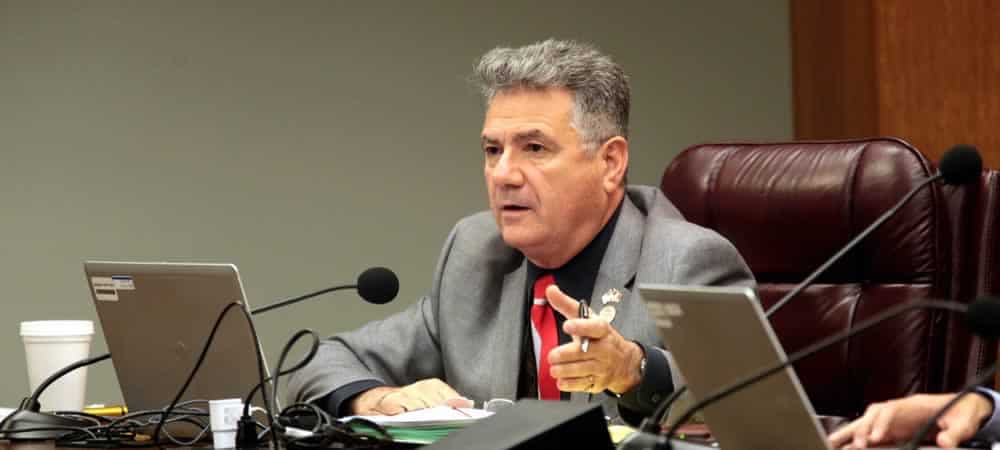• SB 1158 had strong initial support among the tribal casino community.
• The bill sought to give Arizona tribes exclusive rights to offer sports wagering.
• Tribes prefer in-casino wagering to SB 1158’s statewide kiosk model.
PHOENIX – In January, chances seemed good that Arizona would legalize sports betting sometime this year. Now, with the 2019 legislative session adjourned, that timeline is effectively off the table.
Proposed by Sen. Sonny Borrelli (R-5), SB 1158 was first read in the upper chamber on January 23. The bill was read again on January 24, and it’s been held in committee ever since.
Early on, Borrelli gave his bill an 80-percent chance of passing. However, his bill’s initial support came largely from the community, not Borrelli’s peers in the statehouse.
“So far I’ve got support from the tribes and support from the bar industry, if you will. Even nonprofits, the Elks, the American Legion are excited. This is something they can have in their lodge or post.”
Indeed, Borrelli’s SB 1158 is unusually generous to Arizona tribes, giving them exclusive rights to conduct sports wagering on-site and via kiosks scattered throughout the state. Most sports betting bills in the US have favored commercial operators over tribal ones.
The proposal also allows the state’s tribal compacts to remain intact. Per SB 1158, each sports wagering terminal would count for one “gambling machine” in the total that Arizona law allows tribes to operate.
Currently, among the 24 tribal casinos in the state, that number is 18,158 units. The tribes collectively operate roughly 15,000 units, allowing for sports betting to have a large immediate footprint.
However, most of the state’s 16 different casino-operating tribes came to view SB 1158 as potentially damaging. As the bill progressed, only the Navajo Nation remained vocally supportive.
The Navajo, Arizona’s largest tribe by far, are in dire financial straits. Despite operating just one casino in the state (the Twin Arrows Casino Resort outside Flagstaff), they see sports betting – supported by the statewide kiosk system – as a way to help boost their economy.
But the reach of these proposed off-site kiosks has Arizona’s remaining tribes feeling ill at ease.
The concern of non-Navajo gaming operators in the state has to do with the law’s allowance for off-reservation sports wagering at kiosks in restaurants, bars, and fraternal lodges. These, they argue, could allow for various tribes to cannibalize business from other regional operators.
As a result, many tribes, like the Yavapai Apache Nation and Tohono O’odham Nation, are advocating against the bill in toto. Larry Jackson, Vice Chairman of the Yavapai Apache Nation, is clear in his tribe’s opposition.
“We are opposed to the expansion of gaming in bars and restaurants. Such a result would not only hurt the nation’s on-reservation…casinos, but is a drastic change in Arizona gaming policy which Arizonans do not support.”
Losing the support of most of Arizona’s tribal nations has been a blow to Borrelli’s legislation, but the basic tenets of the bill may not be dead.
Whatever happens in the Arizona sports betting debate going forward, tribal rights and exclusivity are going to be the chief factors. There are no commercial casinos in Arizona, and given the tribal reaction to the statewide kiosk concept, mobile gaming also seems to be a nonstarter.
Whatever bill is eventually passed, legal sports betting will almost certainly be offered exclusively at tribal venues on reservation land.
That said, if it becomes necessary to rework Arizona’s tribal compacts before sports wagering is legalized, the pastime may take another year or two to get up and running in the state.
Advertising Disclosure
In order to provide you with the best independent sports betting news and content LegalSportsBetting.com may receive a commission from partners when you make a purchase through a link on our site.
News tags: American Legion | Arizona | AZ SB 1158 | Elk’s Lodge | Larry Jackson | Navajo | Sen. Sonny Borrelli | Tohono O’odham Nation | tribal compacts | tribal gaming | Yavapai Apache Nation

Andy has been writing professionally for nearly two decades, with the last three years being dedicated to his primary passions: sports wagering news and gambling industry analyses. A walk-on punter, Andy has a particular interest in professional football, baseball, and horse racing betting. Come early May, you can always catch Andy – clad in all white, mint julep in hand – on Millionaires Row at Churchill Downs. In his dreams.


 Bitcoin Sports Betting Sites
Bitcoin Sports Betting Sites Best Online Sports Betting
Best Online Sports Betting Famous Sports Bettors
Famous Sports Bettors States With Legal Sports Betting
States With Legal Sports Betting Sports Betting Events
Sports Betting Events




